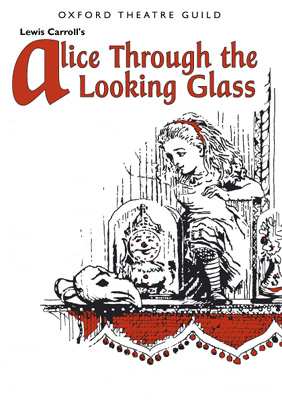The play version of this classic Lewis Carroll story is full of seeming contradictions. It's from the perspective of a young girl, but is probably most fully appreciated by an adult. Logical conundrums are somehow emphasized and resolved by poetry, song and dance. And everything that you took for granted, can't be, in a way that both reaffirms and calls it all into question.
Before being sent to bed, we see young Alice in the dilettante world of adults that she lives in. Everything is big, loud and strange, as it would be to a child. She asks to play a game of chess, but is instead sent off to bed, and told by her governess not to eat the sweets given to her by "Uncle Lewis." Before going, Uncle Lewis describes how the pieces are set up on the board and says that, from the Queen's perspective, it's like seeing into a "looking glass". Then Alice falls asleep.
The logical chess-board background turns into ethereal trees, emphasized by dreamy lighting and glow-in-the-dark reflections. And a band of absurd creatures and chess-pieces appear and disappear rapidly on stage and lead Alice through a series of adventures, impossibilities, and witty but confused word-play, as Alice (the pawn) makes her way across the upside-down, inside-out chessboard land to become queened.
The mood of the play is set by the wistful, dreamy, wonder of Alice (Rachel Johnson). Just as in dream, she hardly acts, but her emotions seem to rise and fall with whatever approaches. She smiles enchantedly one minute and covers her face in tears the next. The sheer wonder is played with a dreamy detachment, so she never really holds onto any of her emotions-they let fall. Her easy manner is always enchanting, but never as engaging as a character in real life.
Because of Alice's smallness, the play relies on big performances from the characters she runs into. The Red Queen, White Knight and especially Humpty Dumpty deliver, giving us nuanced mannerisms, full emotions and verbal play. Humpty Dumpty translates a Jabberwocky poem literally for Alice, turning it into complete nonsense - showing how poetic and non-logical our language is. Looking into the distance another time and asked who she sees, Alice replies "nobody" and is complimented on her amazing eye-sight to see Nobody from such a distance. Then a message-bearer says "nobody is faster than I" and is responded to with "Nobody still hasn't arrived yet from the distance and so Nobody must be slower than you." The logician Carroll seemed to be asking with his cleverness: how can we use words like "nobody" that are, strictly speaking, "nothing"?
Because language and ideas like this are tricky, but pass swiftly on a stage without time to think about them, we can't savour them as fully as we would reading the book. Some of the moments and characters that are undoubtedly enchanting in the book, can't quite capture our attention for the length of time that some of them appear on stage, despite many very energetic and inspired attempts by the actors, and a truly impressive combination of visual stimuli. Still, although the experience isn't engaging all the way through, it leaves you wanting to curl up in your bed afterwards and fall asleep re-reading the old Carroll classic. And wonder, as Alice does at the end after she's woken up, "Was the sleeping man in my dream, or was I in his?"
Oliver Morrison, 8/12/04 |
